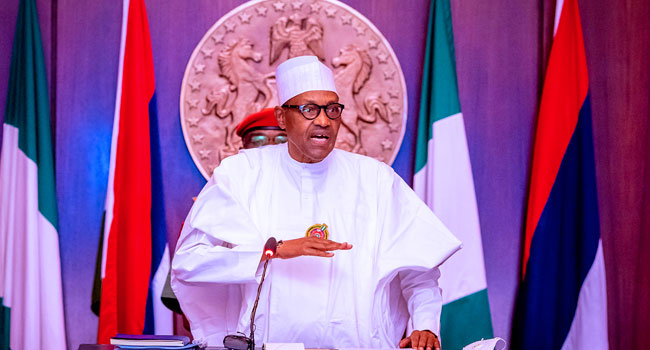President Muhammadu Buhari has presented a N16.39 trillion budget proposal for the 2022 fiscal year to the National Assembly.
The presentation of the Appropriations Bill 2022, was made at a joint session attended by members of both chambers of the National Assembly.
President Buhari arrived the House of Representatives Chamber where the joint session held at about 12:04pm.
The presentation which lasted for an hour ended at 1:05pm.
President Buhari, in his presentation, said the Appropriations Bill 2022, was tagged “Budget of Economic Growth and Sustainability.”
He said allocations to MDAs in the budget were guided by the strategic objectives of the National Development Plan of 2021-2025.
According to him, the plan includes diversifying the economy with robust MSME growth; investing in critical infrastructure; strengthening security and ensuring good governance; enabling a vibrant, educated and healthy populace; reducing poverty; and minimizing regional, economic and social disparities.
He added that defence and internal security would continue to be top priority for his administration.
“We remain firmly committed to the security of life, property and investment nationwide.
“We will continue to ensure that our gallant men and women in the armed forces, police and paramilitary units are properly equipped, remunerated and well-motivated” President Buhari said.
On parameters and fiscal assumptions of the 2022 Appropriations Bill, he explained that same was based on the 2022-2024 Medium Term Expenditure Framework and Fiscal Strategy Paper.
He said oil price benchmark was pegged at 57 US Dollars per barrel; oil production estimate at 1.88 million barrels (inclusive of Condensates of 300,000 to 400,000 barrels per day); Exchange rate at N410.15 per US Dollar; and Projected GDP growth rate at 4.2 percent and 13 percent inflation rate.
He stated that based on these fiscal assumptions and parameters, total federally-collectible revenue wasestimated at N17.70 trillion Naira in 2022.
Buhari explained further that while total federally distributable revenue is estimated at 12.72 trillion Naira,total revenue available to fund the 2022 Federal Budget was estimated at 10.13 trillion Naira, an amount which includes Grants and Aid of 63.38 billion Naira, as well as the revenues of 63 Government-Owned Enterprises.
According to him, Oil revenue was projected at 3.16 trillion, Non-oil taxes estimated at 2.13 trillion Naira and FGN Independent revenues projected at 1.82 trillion Naira.
He said out of the total expenditure of N16.39 trillion Naira proposed for the Federal Government in 2022, N768.28 is for Statutory Transfers of 768.28 billion Naira; N6.83 trillion is for Non-debt Recurrent Costs;and N4.11 trillion for Personnel Costs.
Others are N577.0 billion for Pensions, Gratuities and Retirees’ Benefits; N792.39 for Overheads; N5.35 trillion for Capital Expenditure, including capital component of statutory transfers; N3.61 trillion for Debt Service; and N292.71 billion Naira for Sinking Fund to retire certain maturing bonds.
He, however, emphasised that the expected total fiscal operations of the Federal Government would result in a deficit of 6.26 trillion Naira, an amount representing 3.39 percent of estimated GDP, which, according to him, is slightly above the 3 percent threshold set by the Fiscal Responsibility Act 2007.
In addition, the President disclosed that efforts were being made by his administration to partly support the realization of fiscal projections by reviewing the current tax and fiscal laws to produce a draft Finance Bill 2022.
It is our intention that once ongoing consultations are completed, the Finance Bill would be submitted to the National Assembly to be considered alongside the 2022 Appropriation Bill”, he said.



